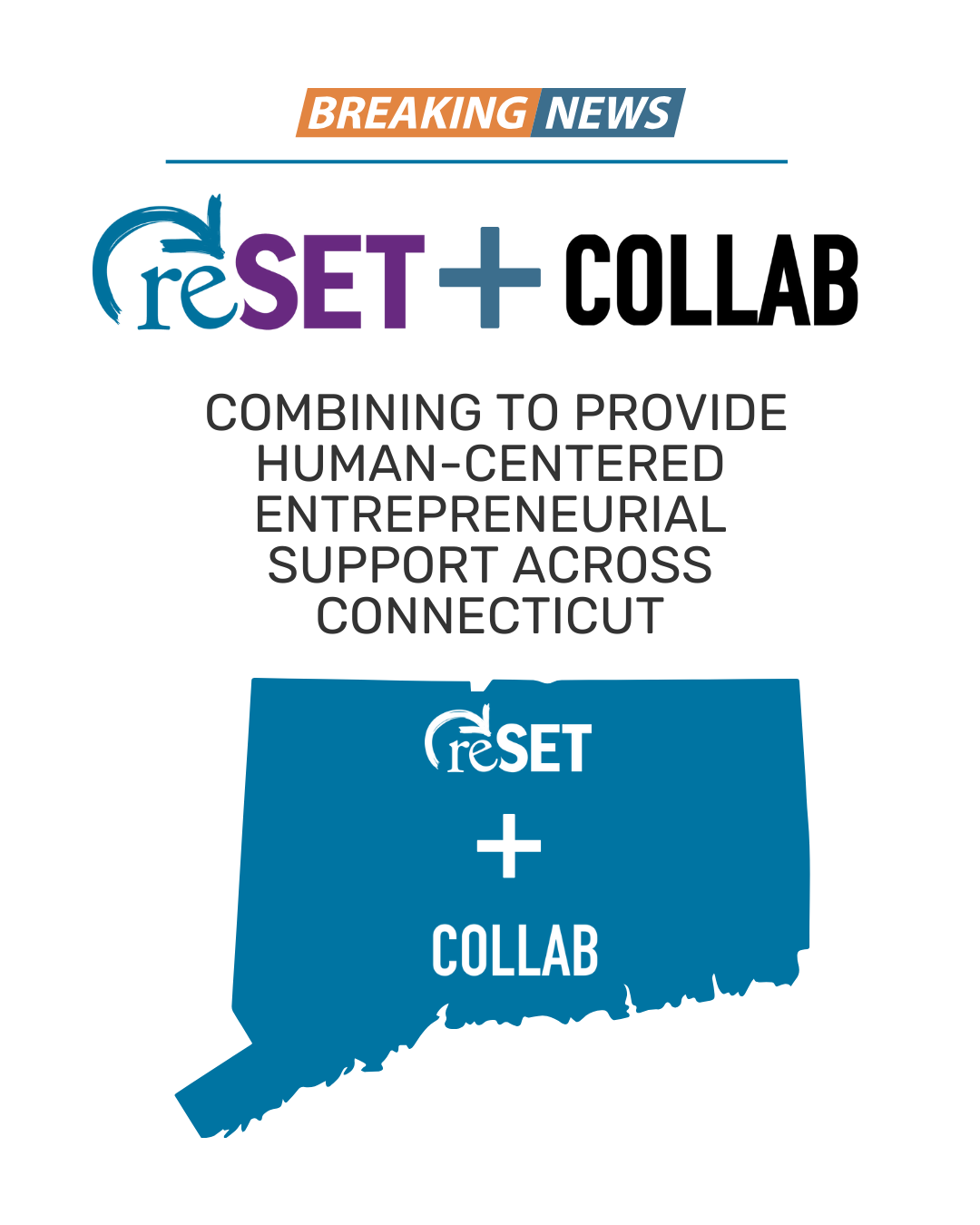By: Matt Pilon
09/15/14
On Oct. 1, Christopher Brechlin plans to convert his Willimantic civic startup, Blueprint for a Dream, into one of Connecticut’s first benefit corporations.
But he won’t be alone.
Up to 30 companies are expected to file paperwork with the Secretary of the State’s office next month to become benefit corporations, as the new business legal status officially becomes permissible in Connecticut, according to reSET, an accelerator for social and environmentally conscious businesses that advocated for the new law.
That would give Connecticut one of the strongest starts among the 26 states that have authorized the unique corporate status, which allows companies to gain certain legal and other advantages by registering as a hybrid nonprofit, for-profit entity.
Whether the new corporate status becomes mainstream, or serves just a small niche, remains to be scene, but advocates are working to make Connecticut a destination for socially conscious companies, entrepreneurs and investors.
“I think people are hoping for more impact investors to come into Connecticut and for Connecticut to be a hub,” said David Menard, a partner with Hartford law firm Murtha Cullina, who has teamed up with reSET to offer legal counsel to companies considering the new legal status.
Nascent industry
Benefit corporations are still quite new, with less than 1,200 having sprung up across the United States since 2010, according to industry tracker Benefitcorp.net. Many are small, but several larger companies have adopted the status, including Tom’s of Maine and King Arthur Flour.
Benefit corps can’t take donations or claim tax exemptions like a nonprofit, but they do share in the do-good marketing cachet that comes with offering up some profits to charitable causes.
“As much as this provides a benefit and it’s a legal entity, it’s very much a marketing opportunity,” Menard said.
But the legal protections are important too. Benefit corps are shielded from potential lawsuits by shareholders who allege that directors did not act in their best financial interests.
Traditionally, corporations are legally bound to put shareholder interests above all others.
But a benefit corporation could, for example, accept a buyout from a company that shares their ideals, but didn’t offer the highest purchase price, without fear of legal retribution.
Shareholder lawsuits over forfeited profits are a major issue, said Menard, which is why the legal protection is important.
“It comes up fairly often in my corporate law practice,” he said.
Like nonprofits, benefit corps have annual public disclosure requirements, but they won’t be required to intricately detail revenue or other financials. Benefit corps can also earn profits and take on equity investment.
The ability to raise money was important to Brechlin, who has built a low-cost software platform nonprofits can use to track and visualize economic and other data to support their respective efforts.
“Quite honestly, I wanted to own my own business,” Brechlin said. “For me, the nonprofit option didn’t quite work.”
That also rings true for Elizabeth Greenberg of Non-Scents Flowers, a Simsbury company that hires refugee women to make origami floral arrangements for infection-sensitive hospital patients and others. Non-Scents also plans to convert to a benefit corp.
PHOTO | PABLO ROBLES
Mimi Greenberg of Simsbury’s Non-Scents Flowers shows off some of the company’s origami products at a local chamber event. Greenberg’s daughter, Elizabeth Greenberg, founded the company, which plans to convert to a benefit corporation this October.
“People like to do good but they like to help themselves as well,” Greenberg said.
Besides some paperwork and annual reporting — and in Greenberg’s case actually starting to donate some profits — neither fledgling entrepreneur thinks the new legal status will change much about how their company operates.
Civic-tech startup opportunity
Brechlin got his first taste of the nonprofit world three years ago when he was working for anti-poverty nonprofit Americorps Vista and the Nonprofit Alliance of Northeastern Connecticut (NANC), shortly after graduating from Eastern Connecticut State University.
He was trying to develop software tools for NANC to track and organize data, and quickly learned how prohibitive software and IT costs can be.
He started Blueprint, and last November landed his first gig: Helping a public-private partnership called the Greater Windham Region Ten Year Plan To End Homelessness track area economic data. The group used that data to help draft grant proposals.
Christopher Brechlin was a major advocate of Connecticut’s new benefit corporations law, even providing testimony to convince state lawmakers to adopt the new legal business status.
Brechlin, who recently began working with the city of Hartford to evaluate income, education and employment metrics, plans to market his software to a wide range of nonprofits.
By using open source tools such as Word Press, Brechlin says his software will cost less and be more user-friendly for basic computer users than products offered by competitors.
There are indications socially conscious investors may be interested in such a program.
A recent study by the Knight Foundation found that between 2011 and 2013, foundations, investors and companies invested $431 million in “civic-tech” companies, which is Brechlin’s niche.
“That’s important because I want my impact to be global, if possible,” he said.
Likewise, Greenberg said she hopes to grow her small firm — which she runs with her mother and business partner Mimi Greenberg — into a nationwide company that could one day be an acquisition target for 1-800-Flowers or a similar company. She said she plans to donate some profits to various charities each year, including Connecticut Children’s Medical Center.
Early adopters
James Woulfe, a public policy and impact investing specialist at reSET, which has a downtown Hartford office that offers a social business accelerator program and co-working space, said most benefit corps early adopters will be companies already working with some social mission or purpose.
ReSET has positioned itself as a go-to resource for Connecticut’s nascent benefit corporation industry. For years, the nonprofit doggedly pursued passage of the new law, which it managed to push through the legislature this spring, after two previous failed attempts.
Woulfe has been helping coordinate with business and networking groups, attorneys, investors and others in preparation for the launch of the new law.
Meanwhile, professional service providers, including corporate attorneys like Menard, see the new legal status as a way to add to their expertise and client base.
Menard said attorneys will need to know about the new law to help companies convert their corporate status and comply with annual filing requirements. They also need to be ready for any litigation that may come down the road in what is a relatively new area of business law.
“I think it’s important to the legal professional,” he said.
Connecticut’s unique law
Though other states have adopted benefit corporations, a provision in Connecticut’s law will have companies treading new ground.
Benefit corporations can legally revert back to a for-profit status, but Connecticut’s unique “legacy preservation” provision gives company shareholders the option to lock-in their benefit corporation status permanently. But it requires 100 percent shareholder approval and can only be done after a two-year waiting period.
The preservation option could have far-reaching implications. It, for example, could make it harder for benefit corps’ owners to sell their business, particularly if interested buyers don’t want to carry on the company’s mission or charitable efforts.
It can also give some firms a leg-up in marketing against competitors, especially in businesses catering to likeminded nonprofits and principled investors, experts say. But there is also no legal precedent for the new provision, which creates some uncertainty.
That’s fine with Brechlin, who said he hopes to preserve his company’s benefit status.
“I want the mission to come first,” he said.
A new nonprofit partner
Meantime, despite many of them having charitable goals or missions, benefit corporations are largely going to come from the for-profit sector rather than the nonprofit world, observers say.
“Most nonprofits will probably stay pretty true to their mission and probably not convert to a benefit corporation,” said Jeffrey Shaw, director of public policy for the Connecticut Association of Nonprofits. But that doesn’t mean benefits and nonprofits can’t, or won’t, work hand in hand, he added.
Shaw said the support of benefit corporations could provide a valuable “piece of the funding puzzle” for nonprofits, many of which have struggled to return to pre-recession funding levels.
“I’m not ruling anything out,” Shaw said. “It’s an exciting new law.”








